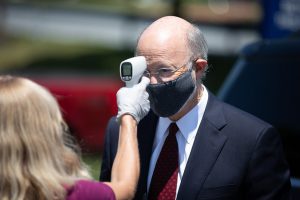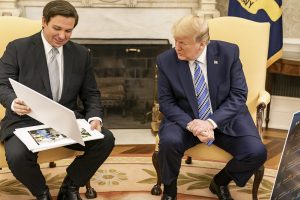
Byron Allen reduces Donald Trump to black “hired help”
We like nothing better than to hear folks effectively frame their political arguments, and yesterday, black media entrepreneur Byron Allen did just that. At a Yahoo! Finance economic conference focusing on recovery from the COVID pandemic, when the subject of Donald Trump calling unflattering or inconvenient news reports “fake news,” Allen said:
President Trump is completely wrong. What he’s not understanding is that he’s nothing more than temporary hired help. He works for the American people. He answers to us, we don’t answer to him.
Allen’s statement is so important as a reminder that, while Trump has locked children in cages, sent armed thugs to kidnap peaceful protesters in our cities, refused to obey subpoenas, enriched himself and his family at our expense, and committed many other deplorable and even illegal acts while in the White House, our Constitution provides that the president is supposed to be the servant of all Americans, not the other way around. That is an important statement about who really has the power in the United States, once they recognize it.
A second brilliant element of Allen’s remarks is that he flipped the script on hundreds of years of U.S. racial history, where blacks literally were brought here against their will as “help,” i.e. as slaves, only to continue to be “hired help” for whites for generations, at substandard wages, after obtaining their freedom. By calling Trump “hired help,” Allen completely reverses this racial stereotype and reminds us that Trump, a white man, is hired to serve black Americans, brown Americans, women, and the rest of us. One could even say that Byron Allen figuratively turned Donald Trump into a black man in terms of Trump’s status in America. And finally, Allen’s description of Trump as “temporary” points us to the light at the end of the tunnel, suggesting that whatever pain Trump is inflicting upon America will end someday, hopefully by next January 20 if enough voters come out and vote the right way this November.
Well done, Byron Allen.
Photo by Kheel Center, used under Creative Commons license. https://is.gd/K7xIVH












